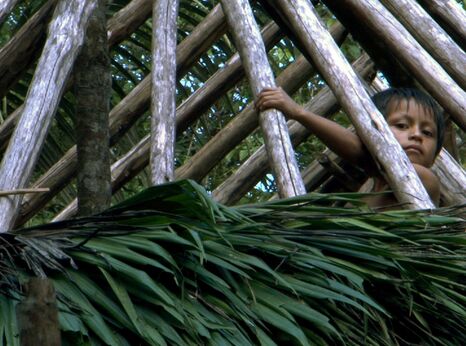Covid-19 threatens indigenous peoples lives

Indigenous peoples in the Ecuadorian Amazon face a higher risk situation in the context of the pandemic due to lack of access to drinking water, food sources, medical supplies, health services and COVID-19 tests, caused by prolonged conditions of inequality, exclusion and discrimination.
In August (unspecified date), the Government published the Protocol with intercultural relevance for the prevention and care of COVID-19 in Indigenous, Afro-Ecuadorian and Montubio peoples and nationalities in Ecuador, with the objective of "Establishing procedures for inter-institutional, inter-sectoral coordination and among social actors present in the territories of the peoples and nationalities of Ecuador, to provide a coordinated response and with intercultural relevance to the health emergency by COVID-19".
According to the document, it was prepared by various government officials, with the support of the Pan American Health Organization (PAHO) and "validated" by members of the Confederation of Indigenous Nationalities of Ecuador (CONAIE) and Confederation of Peoples of the Kichwa Nationality of Ecuador (ECUARUNARI). The "Emission with contributions and recommendations from delegates of Communities, Peoples and Nationalities" is dated 24 July 2020.
Indigenous and human rights organizations in the Amazon said this protocol was not adequately consulted with Indigenous communities in the Amazon, does not reflect their demands, and that they have been excluded from the Emergency Operations Committees in charge of implementing it.
After an insufficient response by the state, organizations like the Confederation of Indigenous Nationalities of the Ecuadorian Amazon (CONFENIAE), Amazon Watch, Amazon Frontlines, Fundación ALDEA and Universidad San Francisco de Quito have led efforts to prevent, identify and treat COVID-19 cases of Indigenous peoples in the Ecuadorian Amazon through providing tests, culturally-appropriate information, personal protective equipment, hygiene products, basic medicines and creating a website to monitor the pandemic and identify contagion hotspots.
On 19 August, these organizations reported 3,303 infections (2,301 confirmed and 1,002 suspected) and 80 deaths (35 confirmed and 45 suspected) related to COVID-19 among the Indigenous population in the Ecuadorian Amazon, which is 290,000. According to them, all Indigenous nationalities (ethnicities) in the Ecuadorian Amazon have cases of COVID-19. Due to scarcity of tests, the real numbers are expected to be much higher.
On 18 June, Judicial authorities granted precautionary measures to the Waorani People in the context of the COVID-19 pandemic, including testing suspicious infection cases, providing medical personnel and supplies, providing humanitarian aid, and limiting company operations near their territory. Nevertheless, Indigenous and human rights organizations told Amnesty that authorities have not fully complied with them.
In addition to the pandemic, on 7 April, an oil spill in the Amazon polluted the Coca and Napo rivers, affecting the environment, water, food and livelihoods of nearly 120,000 people of which 27,000 are Indigenous, mainly belonging to the Kichwa and Shuar nationalities.
On 29 April, a group of Indigenous and human rights organizations filed a constitutional protection proceeding and requested precautionary measures on behalf of the nearly 120,000 people affected by the oil spill. The petition holds responsible the Ministry of Energy and Natural and Non-Renewable Resources, the Ministry of the Environment, the Ministry of Public Health, the state oil company Petroecuador, and the private company OCP. The petitioners reported that the judge in charge of the case endangered guarantees to due process through procedural irregularities.